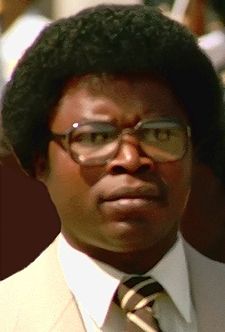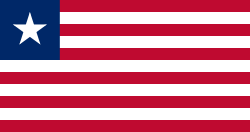Samuel Doe
| Samuel Kanyon Doe | |
 |
|
|
21st President of Liberia
|
|
|---|---|
| In office January 6, 1980 – September 9, 1990 |
|
| Vice President | Harry F. Moniba |
| Preceded by | William R. Tolbert, Jr. |
| Succeeded by | Charles G. Taylor |
|
|
|
| Born | May 6, 1951 Tuzon, Liberia |
| Died | September 9, 1990 (aged 39) Monrovia |
| Political party | National Democratic |
Samuel Kanyon Doe (May 6, 1951 – September 9, 1990) was the 21st President of Liberia from 1980 to 1990. His regime was characterized by ethnically-based dictatorship and the suppression of political opposition.
Doe was an ethnic Krahn, part of a rural tribe in inland Liberia. The Krahn are a minority ethnic group but part of the large majority of the Liberian population that are of indigenous descent. These groups faced economic and political domination by the Americo-Liberian elites, who were descended from free-born and formerly enslaved blacks from America who founded Liberia in 1847.
Under Doe, Liberian ports were opened to Canadian, Chinese and European ships, which brought in considerable foreign investment from foreign shipping firms and earned Liberia a reputation as a tax haven.
Doe attempted to legitimize his regime with a new constitution in 1984 and elections in 1985. However, opposition to his rule only increased, especially after the 1985 elections which were declared to be fraudulent by the U.S. and other foreign observers. In the late 1980s, as fiscal austerity took hold in the United States and the threat of Communism declined with the waning of the Cold War, the U.S. became disenchanted with entrenched corruption in Doe's government and began cutting off critical foreign aid to Doe. This, combined with the popular anger generated by Doe's favoritism toward his native Krahn tribe, placed him in a very precarious position.
A civil war began in December 1989, when rebels intent on toppling Doe entered Liberia. Doe's forces were defeated, and in September 1990 he was captured, tortured, and killed.
Contents |
1980 coup, new government
On April 12, 1980, Doe led a military coup, killing President William R. Tolbert, Jr. in the Executive Mansion. Many claim that Doe and some of his men disemboweled President Tolbert in his bed while he slept. Twenty-six of Tolbert's supporters were also killed in the fighting. Thirteen members of the Cabinet were publicly executed ten days later. Hundreds of government workers fled the country, while others were imprisoned.
The early days of the regime were marked by mass executions of members of Tolbert's deposed government. One of Doe's first acts after seizing power was to order the release of about 50 leaders of the opposition Progressive People's Party who had been jailed by Tolbert during the rice riots of the previous month. Shortly after that, Doe ordered the arrest of 91 officials of the Tolbert regime. Within days, eleven former members of Tolbert's cabinet, including Tolbert's brother Frank, were brought to trial to answer charges of "high treason, rampant corruption and gross violation of human rights."[1] Suspension of the Constitution allowed these trials to be conducted by a Commission appointed by the state's new military leadership, with defendants being refused both legal representation and trail by jury.
Thus ended 133 years of Americo-Liberian political domination. This coup was hailed as the first time since Liberia's establishment as a country that it was governed by people of native African descent instead of the "Americo-Liberian" elite, although persons with no Americo-Liberian heritage had held the Vice Presidency (Henry Too Wesley), Ministerial positions and served in the Legislature years prior. Many people welcomed Doe's takeover as a shift favoring the majority of the population that had largely been excluded from participation in Government since the establishment of the country. However, the new government, led by the leaders of the coup d'état and calling itself the People's Redemption Council (PRC), lacked experience and was ill prepared to rule. Doe became head of state and suspended the constitution, but promised a return to civilian rule by 1985.
Theories on the genesis of the coup
In August 2008, before a Truth and Reconciliation Commission (TRC) in Monrovia, Former Justice Minister under Samuel Doe, Cllr. Chea Cheapoo alleged the American CIA had provided the map of the Executive Mansion, enabling the rebels to break into it; that it was a white American CIA agent who shot and killed Tolbert; and that the Americans ‘were responsible for Liberia’s nightmare.’[2] However, the next day, before the same TRC, another former Minister of Samuel Doe, Dr. Boima Fahnbulleh, testified that ‘the Americans did not support the coup led by Mr. Doe.’[3]
The mystery of the 1980 coup is clouded in the "Unknown Soldier". It is reported that the "Unknown soldier" was one of the "white" mercenaries who staged the 1980 military take over of the century-long one party state. According to Mrs. Victoria Tolbert in her book, wife of the slain President William R. Tolbert, she saw a masked man with a "white" hand stabbing her late husband.
Presidency
Relations with the United States
During his first years in office, Doe quickly re-established diplomatic relations with the United States.[4] He openly supported U.S. Cold War foreign policy in Africa during the 1980s, severing diplomatic relations with Libya and the Soviet Union).
The United States valued Liberia as an important ally in the Cold War ally, helping to contain the spread of Soviet influence in Africa. As part of the expanding relationship, Doe agreed to a modification of the mutual defense pact granting staging rights on 24-hour notice at Liberia's sea and airports for the U.S. Rapid Deployment Forces, which were established to respond swiftly to security threats around the world.
However, in 1985 while the US C.A.R.E. organization was actively shipping thousands of tons of rice, to Liberia for the people into the port of Monrovia, Samuel Doe's army would guard the port, and the rice was removed from the ships and placed in warehouses at the dock and then turned around and loaded onto Soviet flagged ships. So this author questions the commitment of Samuel Doe to anything other than money. There were also occasions when the army shot people working as longshoremen that tried to steal from the cargo to feed their families. 1985 saw many protests of the man they called Sergeant Doe that were suppressed by the Liberian army . (Eye Witness Account)
New constitution and elections
A draft constitution providing for a multiparty republic was issued in 1983 and approved by referendum in 1984. On July 26, 1984 he was elected President of the Interim National Assembly.[5] Doe had a new constitution approved by referendum in 1984 and went on to stage a presidential election on October 15, 1985, giving himself 51% of the vote. The election was heavily rigged, as he took the ballots to a secret location and had 50 of his own handpicked staff count them, and prior to the election he had murdered more than 50 of his opponents. It is also thought that Doe changed his official birth date from 1951 to 1950 in order to meet the new constitution's requirement that the president be at least 35 years old. Thomas Quiwonkpa, who had been a leader of the 1980 coup along with Doe, attempted to seize power on November 12; the attempt failed after fighting in Monrovia and Quiwonkpa was killed. Doe was formally sworn in on January 6, 1986.
1985 elections
In the elections of 15 October 1985, nine political parties sought to challenge Doe's National Democratic Party of Liberia (NDPL), but only three were allowed to take part. Doe was elected with 51% of the vote, and the NDPL won 21 of the 26 Senate seats and 51 of the 64 seats in the House of Representatives. Foreign observers declared the elections fraudulent, and most of the elected opposition candidates refused to take their seats.
Assistant Secretary of State for African Affairs Chester Crocker testified before Congress that the election was imperfect but that at least it was a movement toward democracy. He further justified his statement with the claim that, in any case, all African elections were known to be rigged at that time.
Doe's corrupt government became more repressive, shutting down newspapers and banning political activity. The government's mistreatment of certain ethnic groups, particularly the Gio (or Dan) and the Mano in the north, resulted in divisions and violence among indigenous populations who until then had coexisted relatively peacefully.
Assassination
Charles Taylor, a former ally of Doe's, crossed into Liberia from Côte d'Ivoire on December 24, 1989 to fight a guerrilla war against him. Taylor had broken out of a United States jail after Doe had accused him of embezzlement. By mid-1990, most of Liberia was controlled by rebel factions. Doe was captured in Monrovia by faction leader Prince Y. Johnson on September 9, 1990 and tortured before being killed. The spectacle was videotaped and seen on news reports around the world. The video shows Johnson sipping a Budweiser as Doe's ear is cut off.[6][7]
References
- ↑ "LIBERIA: After the Takeover, Revenge". TIME Magazine. 1980-04-18. http://www.time.com/time/magazine/article/0,9171,924057,00.html#ixzz0dsadsRgy.
- ↑ The News (a Liberian Newspaper), Aug 6 2008 (retrieved 6-8 Aug.) CIA Agents Executed 1980 Coup
- ↑ The News, Aug 7 2008 (retr. 7-8 Aug.) Harry Greaves, Tom Kamara, Others Linked
- ↑ "President Samuel K. Doe (1980-1990)". http://www.liberiapastandpresent.org/SamuelKDoe.htm. Retrieved 2010-02-16.
- ↑ Europa World Year Book 1985
- ↑ "Meeting the hard man of Liberia," BBC
- ↑ "Scare Tactics," Slate
| Preceded by William R. Tolbert, Jr. |
Head of People's Redemption Council 1980–1986 President of Liberia 1986–1990 |
Succeeded by Dr. Amos Sawyer |
| Preceded by none |
President of the Interim National Assembly 1984–1985 |
Succeeded by none |
|
|||||||||

